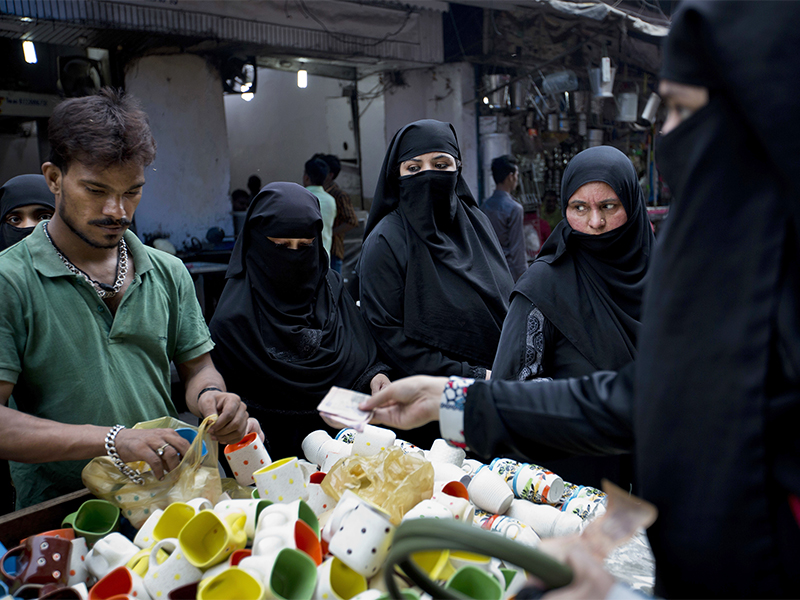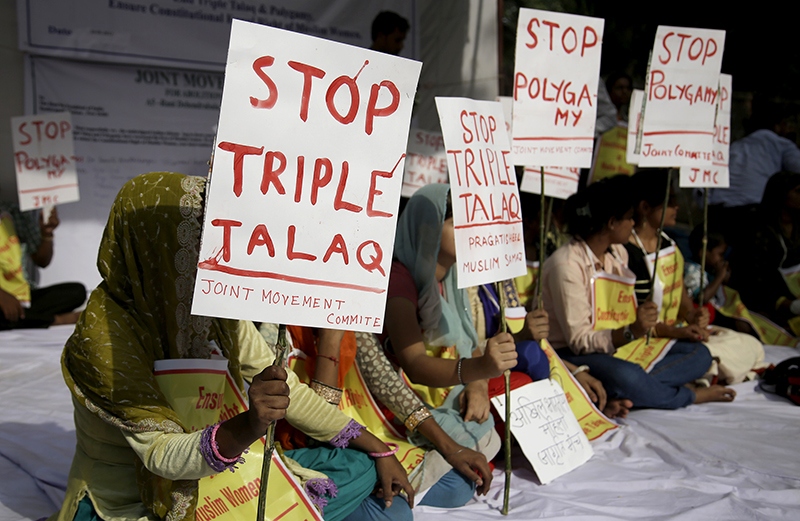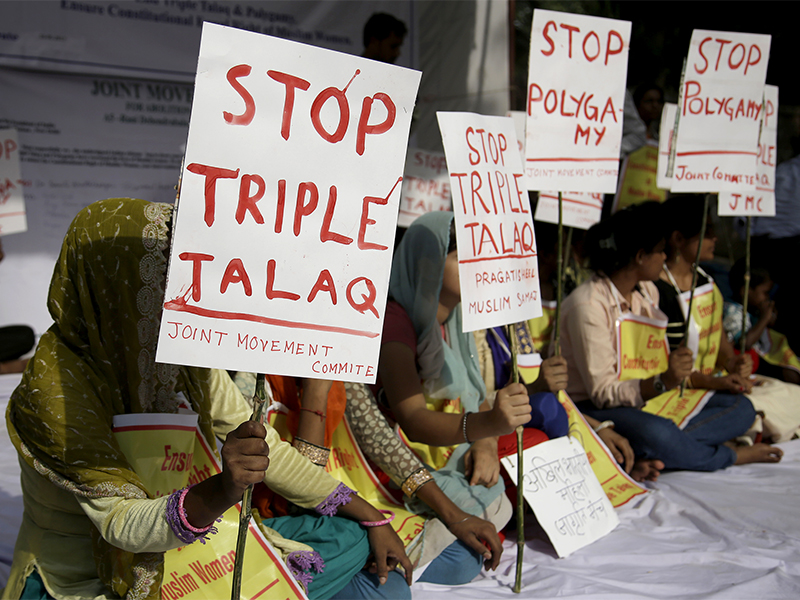
Indian Muslim women buy mugs at a market area in New Delhi on Aug. 22, 2017. India’s Supreme Court struck down on that day the “triple talaq” Muslim practice that allows men to instantly divorce their wives as unconstitutional. (AP Photo/Tsering Topgyal)
VARANASI, India (RNS) — Many Muslim women in India are hailing this week’s court decision banning “instant divorce,” the Muslim practice by which a man ends his marriage simply by saying “talaq,” or “I divorce thee,” three times.
But some wonder whether Muslims in poor and rural areas will abide by or even learn of the ruling. Yet others decry the ban as yet another violation of Muslim religious rights in a nation where an upsurging Hindu nationalism has already unnerved the large minority of Indians who practice Islam.
[ad number=“1”]
The court banned what is known as “triple talaq” on Tuesday (Aug. 22) after reviewing cases in which Muslim women attested to their shame and destitution after former husbands — some through text messages — divorced them in seconds.
“I am familiar with a couple of cases of talaq which ultimately ruined the girl and her family,” said Saba Sheikh, 25, a student in Varanasi. “After the verdict, I am more certain that my brother and father will marry me off with less fear.”
Afreen Rahman, one of the seven Muslim women who brought her case to court, told RNS that she turned to the justice system because she had run out of options.

Afreen Rahman holds the letter her husband used to divorce her. Photo courtesy of Afreen Rahman
Three years ago, her brother took out a bank loan to pay for the dowry for her marriage. But during that yearlong union, she said, her husband beat her because its size did not meet his expectations. Eventually, he locked her out of the house and divorced her by sending her a letter with the word, “talaq” written three times.
With her parents deceased — her mother due to an accident that also seriously injured her — and after her adult brother killed himself over her divorce, she says she was desperate.
“We consulted every Islamic cleric and organization we could find,” she recalled. “Everybody said that this way to divorce was ‘ethically wrong’ but still valid.”
In India, especially in the rural areas and smaller cities, not only are a woman and her family shamed after divorce, but she is usually unable to remarry, the petitioners told the court. Talaq is banned in parts of the Muslim world, and not mentioned in the Quran, but is mentioned in writings held sacred, but of lesser authority.
[ad number=“2”]
Syeda Fatima received a short text over the instant messenger WhatsApp from her husband in July 2014 and was suddenly divorced.
“At first I thought it was a bad joke,” Fatima, 32, of Bhopal in central India, who was married in 2012. “I realized that it was for real when I went to meet my husband.”
“Many of us has suffered this,” Fatima added. “But it is good now that future generations will not suffer anymore.”
Some Indian Muslims do not welcome the talaq ban and see it as yet another encroachment on their religious rights.
India’s 172 million Muslims are nevertheless a minority in a country led for the past three years by Prime Minister Narendra Modi, who heads a pro-Hindu party and has favored politicians who spout anti-Muslim rhetoric. As attacks on Muslims by Hindu vigilantes mount, followers of Islam in India grow increasingly unnerved.

Activists of various social organizations hold placards during a protest against “triple talaq,” a divorce practice prevalent among Muslims in New Delhi, on May 10, 2017. (AP Photo/Altaf Qadri)
Some Muslims call the court’s ban a violation of Islamic law.
“Any attempt to trample upon religious rights should not be condoned — we will continue to fight against any such attempt at every level,” said Jamiat Ulama-e-Hind, one of India’s largest Muslim organizations, in a statement.
Some Muslims who don’t support talaq nevertheless contend that the matter is not for the government, but for Muslims, to decide. Generally in India minority religious communities get to follow their own rules for marriage and divorce.
Said Kamal Faruqui, a member of the All India Muslim Personal Law Board, an organization that defended talaq at court: “The court order has affected the rights of the religious minority to practice their religion so it will be having wide ramifications.”
“Our feeling is that the judgment (violates) constitutional guarantees.”
Government officials dispute any Hindu favoritism in the 3-2 ruling, which was handed down by a five-judge panel that included one Muslim judge. He voted with the minority.
[ad number=“3”]
“This verdict should be seen beyond the pale of communal divide since it is an issue of gender justice and equality,” said Indian Law Minister Ravi Shankar Prasad.
Meanwhile, some worry that regardless of the law, instant divorces will continue.
“The verdict by the Supreme Court needs to reach the common rural Indian families, where people do not know about the laws,” said Naseem Akhtar, a rights activist with Bhartiya Muslim Mahila Andolan, a group that advocates for Muslim women, and has been counseling women divorced through talaq for the past six years.
“I have requested Islamic bodies and clerics to spread the information about this verdict,” added Akhtar, who also helped Rahman petition the court against her divorce. “They can easily do it if they just announce it from mosques during everyday prayers.”
But attorney Flavia Agnes, who specializes in matrimonial law and divorce proceedings, is pessimistic about the likelihood that the ban can be fully enforced, not least because Islamic authorities would be reluctant to spread the word of a ruling that offends them.
Besides that, it would require every talaq case to be challenged in the courts, she said, something that might be difficult or impossible for poor women.
“The verdict is not going to change anything,” she said. “Suppose if a husband pronounces divorce, then the woman has to go court, hire a lawyer just to prove the husband wrong.”
Understanding its potential limitations, 27-year-old Fatima Feroze, a student from New Delhi, still sees the verdict as offering hope to Muslims.
“The community is often accused of being backward, mistreating women,” she said. “This verdict will help women’s suffering end.”





